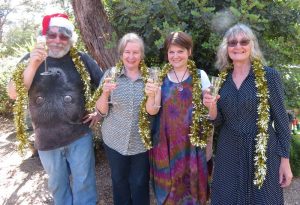 The Editorial Board of the newsletter wish you a Merry Christmas. From right to left: Judy (Vizzari), Ann (Stanley), Robin (Gale-Baker) and Guy (Palmer).
The Editorial Board of the newsletter wish you a Merry Christmas. From right to left: Judy (Vizzari), Ann (Stanley), Robin (Gale-Baker) and Guy (Palmer).
The 2019 Golden Seedling awards
As ever, my 2 cents only. Now in their 5th year.
Also as ever, the two most difficult awards to decide on are Community Garden of the Year and Food Swap of the Year, as I only visited a minority of them during the year. 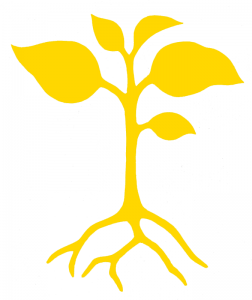 If I haven’t been to your community garden or food swap and you think I should, send me an email and we’ll organise.
If I haven’t been to your community garden or food swap and you think I should, send me an email and we’ll organise.
Awards to individuals
- Newsletter contributor of the year – a joint award to Ann Stanley, Judy Vizzari and Robin Gale-Baker, all regular monthly contributors, all of whom think straight, write well, and are engaged, reliable, informative and a joy to work with – the newsletter has really gained from all their contributions. Honorary mentions – 3000acres, for their thoughtful articles about urban food production, and Nina Gormley, for her occasional vignettes.
- Newsletter reader of the year – a joint award to the 100 or so of you who have contributed at least once to the newsletter during 2019.
- Entrepreneurial spirit – Ben Frawley: organiser of the weekly Mitcham Community Meal, which now feeds around 60 people each Sunday, with the food cooked by a different community group each week.
Awards to organisations
- Community garden of the year – SEEDs (Brunswick), who have both weekly get togethers and occasional major events and who provide a warm welcome to new arrivals to the garden. Honorary mentions – previous winners Macleod, St John’s Riverside (Heidelberg) and Sylvester Hive (Preston), all of whom continue to go from strength to strength.
- Food swap of the year – Warrandyte: a great ambience, great food and a beautiful location. Honorary mention – previous winners Forest Hill and Box Hill South.
- Library of the year – Coburg: free events on a wide range of topics. Honorary mentions – previous winners Diamond Valley, Lilydale and Watsonia, all of whom continue to organise numerous free events.
- Neighbourhood House of the year – Central Ringwood: around 20 food-related events during 2019 plus a community garden.
- Community organisation of the year – 3000acres: whenever I visit a community garden, it often turns out that they have received some help from 3000acres. Honorary mention – previous winner Sustainable Macleod, for the energy that they continue to put in to their community garden, food swap, annual auction, workshops and newsletter.
- Social justice organisation of the year – The Community Grocer, who now organise 4 markets in North East Melbourne every week. Honorary mention – previous winner Open Table, for their ongoing provision of free meals to those in need.
- Organiser of the year (non-cooking) – Open Gardens Victoria: around 70 open gardens during 2019. Honorary mention – previous winner Bulleen Art and Garden nursery, who organised 30 different workshops during 2019.
- Organiser of the year (cooking) – Kitchen Warehouse: cooking demos in either Box Hill South or Preston on most weekends. Honorary mention – previous winner Bek McMillan, who continues to hold frequent, varied and affordable cooking classes.
- Market of the year – South Morang Farmers & Makers Market: from nothing to 90 stallholders, including 45 food stallholders, in 6 months.
- Council of the year – Whitehorse: numerous free events on a range of topics across the municipality. Honorary mentions – previous winners Banyule (cf. support for community groups) and Darebin (cf. their continuing program of activities).
- Suburb of the year – Preston: for the varied and numerous events held there, including those organised by Kitchen Warehouse, Open Gardens Victoria, Preston Garden Club, Preston Library, Preston Market, Sylvester Hive Community Garden and The Bridge (community lunch), as well as the Mind Your Step Festival, the Darebin Backyard Harvest Festival and the Darebin Homemade Food & Wine Festival. Honorary mention – Coburg (Coburg Community House, Coburg Food Swap, Coburg Library, Joe’s Market Garden and Monique Miller).
Newsletter links
- Most popular recurring event link – the Doncaster Garden Club.
- Most popular specific event link – Edendale’s Introduction to Horticulture course which started on 4th May.
- Most popular website link – what veggies can be planted this month.
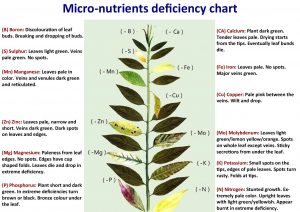 Most popular newsletter image – the micro-nutrients deficiency chart.
Most popular newsletter image – the micro-nutrients deficiency chart.
- Most popular external link – the video of me talking about my garden (yay!).
If you’re still looking for a Christmas present for that special person
My first suggestion is The Seed Savers’ Handbook, which is a complete reference for seed saving vegetables. Although it was written in 1993, it hasn’t dated much. $32. Available from the original publishers, SeedSavers.
My second suggestion is something called an Urbipod. It is a complete kit for growing microgreens. At $229, it is certainly not the cheapest way of growing microgreens but it is both easy and beautiful. Hence, its suitability as a present. You can buy either online or at Kitchen Warehouse. Watch out for my review in the new year.
 Chris Newman has written in with a cooking suggestion: if you have a gingerbread cookie cutter, turn it upside down and make your children (or grandchildren) reindeer.
Chris Newman has written in with a cooking suggestion: if you have a gingerbread cookie cutter, turn it upside down and make your children (or grandchildren) reindeer.
Want a job?
Templestowe College are wanting to hire a permaculture gardener. You can get a feel for the place by reading our recent interview with Drew Barr. 30 hours a week during term times. Closing date: 13th December. Read more and apply.
A source of free sawdust
Furniture maker Heimur would like to give away their sawdust for use in compost or form animal bedding. Based in Coburg North. Contact Nathan by email (Make@heimur.com.au).
Furniture maker Yard Furniture would like to give away their wood shavings. Bags of 20+kg are available to pick-up outside their premises at 271 Dundas Street, Preston (or bring your own bag to take smaller quantities). Contact details: Peter McManus, peter@yardfurniture.com.au.
Thanks for the heads up, Morgan Koegel!
Other local resources, such as people who give away manure and coffee grounds, can be found on our website.
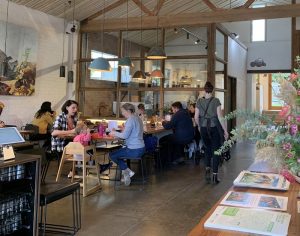 A new(ish) cafe in Hurstbridge
A new(ish) cafe in Hurstbridge
Nina Gormley writes in: have you discovered the Black Vice Cafe & Roastery, which opened earlier this year in Hurstbridge? Or, by the same owners Lea and Lachlan, the Bean to Market stall at some local festivals and markets? Black Vice roast their own coffee beans once a week. The roasting process takes 12 minutes then the beans must be aged for 6-8 days before being used in the cafe. Customers can also buy the roasted coffee beans for use at home.
A new local food app
The We Eat Local app is available for both Android and Apple devices. Basically, you enter your postcode or suburb and a list of local eateries, shops and markets appears. Click on any of these and a list of their Victorian food producers appears.
Note that this is the opposite way round than the Local Food Connect app (Android only) that I wrote. Click on the local food producers icon, click on a producer of interest and a list of the places in North East Melbourne where you can buy their food appears.
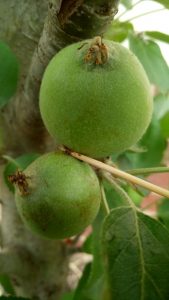 Codling moth
Codling moth
Yvonne Ashby has written in to say that she has noticed that a few of her young applies are being covered with the dark brown eggs from the codling moth (see picture right). The usual spots are the gaps between the fruit and at the tip end of the fruit. She uses a toothpick to scrap off the eggs or thins out some of the fruit that is touching the others. The most affected areas are where there is not much sunlight exposure.
More on milk from farms where the male calves aren’t killed
Someone anonymous wrote in to say that Mother Cow Dairy website doesn’t actually say that they don’t kill their bobby calves. That’s true but when I spoke to the farmer about this, he said that he thought that it was clearly implied in the ‘animal wellbeing section’. In any event, he assured me that all their bobby calves live out their full lives in a sanctuary.
Yes, you did know!
Thanks for your responses Bruno Tigani, Chris Newman and Julie Cabrol!
All the questions and answers are now collated on our website.
Micro-greens
Last week we asked whether micro-greens aregrown from special seeds or are just densely planted and therefore stunted shoots of normal seeds. Bruno Tigani has responded: the seeds used for micro-green production are generally the same varieties that are used to grow full sized plants. They are sown at higher density and harvested at an early stage, often with just the cotyledon leaves.
We also asked whether micro-greens are more nutritious than ‘macro’ greens and, if so, why. Again, Bruno responded: according to this research paper, the nutrient density in micro-green cotyledon leaves are likely higher than those of a mature plant. Among the 25 commercially available microgreens tested, red cabbage, coriander, garnet amaranth, and green daikon radish had the highest concentrations of ascorbic acids, carotenoids, phylloquinone, and tocopherols, respectively. However, as Bruno observes, you might eat 100gm of broccoli at a mature size compared to 10gm as micro-greens, so the absolute amount of nutrition is probably higher from eating mature broccoli.
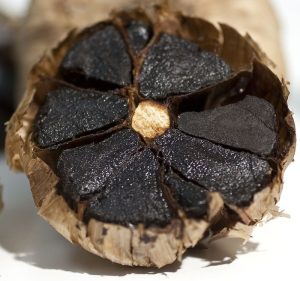 Black garlic
Black garlic
Last week, we asked how to make black garlic and where it can be bought locally. Per Wikipedia, black garlic is made by heating whole bulbs of garlic over the course of several weeks and the taste is sweet and syrupy. Chris Newman says that you can buy it on ebay but that it is very expensive (around $160 per Kg) and that he is going to try making using a black garlic fermenter, which is available on ebay for around $100. Apparently, you just choose the fermenting mode and put the garlic in for up to 12 days and then afterwards let it dry for 5 days.
there is currently no recycling option for corks in Australia.” According to the Ecobin website, this is because corks are not virgin cork and contain other resins.
Which link was clicked most times in the last newsletter?
Robin’s article on shade cloth.
Joke of the week
What did one strawberry say to the other? If you weren’t so fresh, we wouldn’t be in this jam.
New events – not cooking
Beeswax food wraps: Friday, 10th January, 10.15am-11.15pm and again at 11.30am-12.30pm; Brunswick Library.
What: Ever wanted a reusable, sustainable alternative to clingwrap and plastic zip-lock bags? Beeswax wraps, made from fabric and beeswax, are an alternative to one-use plastics. Wrap sandwiches, snacks and other items, cover bowls and plates. You can even fold them over containers and use them again and again! Learn what fabrics to use, where to buy beeswax, and how to create your own reusable food wraps at home.
Cost: free.
Bookings: EventBrite.
Bee hive tour: Sunday, 12th January and again on Saturday, 25th January, both 10.30am-12.30pm; Yarrambat.
What: Your tour, led by Nathan Stewart, a professional Doreen-based beekeeper from Maya ‘Xala Honey, will include suiting up in protective gear, lighting a bee smoker, and spending two hours as real life beekeeper. Initially, Nathan will give you some tips on what to look for inside a hive including how to spot the Queen and where to look to potentially witness the birth of a new worker bee. Then, together you will lift the lid of a busy hive, watch bees at work creating honey, pull out a frame of honey ready for extraction, and get up close with more than 100,000 bees! After the lid is closed, you will sample some of the honey direct from the hives while enjoying a refreshing honey tonic.
Cost: $75 (plus various packages for families).
Bookings: their website.
Sun catchers and mini worm farms – workshop for kids: Thursday, 16th January, 10.30am-midday; Bulleen Art and Garden.
What: Suitable for children aged 5 to 12. Presented by Naomi Cindric. Learn the basics of worm farming by joining this hands-on activity and make your mini worm farm. Learn what worms eat, how to care for them, and how they can be useful in the garden. Be dazzled as you make a colourful array of dangling mirrors and beads that can hang in your garden.
Cost: $35.
Bookings: WeTeachMe.
Beekeeping workshop: Saturday, 18th January, 2-4.30pm; Bee Sustainable, Brunswick East.
What: What you will learn: bee behaviour; the various major items that make up a bee hive and how to construct them; and the major tasks in hive management. There will be live bees and honeycomb to look at in a secure exhibition cabinet and a discussion of bee behaviour and hive management. The major items that make up a hive and their construction will be discussed. The equipment a beekeeper needs to work bees will also be reviewed. The major topics discussed will be: establishing a hive; understanding the tasks to be carried out in Spring; how to go about robbing and extracting honey; and swarm control.
Cost: $80.
Bookings: WeTeachMe.
New events – cooking
Zip.
Summary of upcoming events – not cooking
Over the next week
- Beeswax food wraps: Wednesday, 4th December, 10.15-11.15am; Brunswick Library.
- Beeswax food wraps: Wednesday, 4th December, 11.30am-12.30pm; Brunswick Library.
- The joy of backyard chooks: Thursday, 5th December, 6.30-9pm; Bulleen Art and Garden.
- Native plants for food and medicine: Saturday, 7th December, 9.30am-12.30pm; Bulleen Art and Garden.
- Summer fruit tree pruning workshop: Saturday, 7th December, 9.30am-12.30pm; Richmond.
- Wicking bed workshop: Saturday, 7th December, 10am-midday; Brunswick Neighbourhood House.
- Myo produce bags with Lisa Moore: Saturday, 7th December, 1-4pm; Heidelberg West.
- Tomatoes and more – tomatoes in your edible garden: Saturday, 7th December, 2-3.30pm; Bee Sustainable, Brunswick East.
- Christmas beeswax wrap gift and wrap rejuvenation: Saturday, 7th December, 2-4pm; Central Ringwood Community Centre.
- Summer fruit tree maintenance: Sunday, 8th December, 9.30am-12.30pm; Bulleen Art and Garden.
- Lasagne garden to food forest workshop: Sunday, 8th December, 10am-1pm; Edible Hub, Hurstbridge.
Over the next month
- Sustainable gardening: Thursday, 12th December, 11.30am-12.30pm; Fawkner Library.
- Garlic braiding with Farmer Incubator: Saturday, 14th December, 10am-midday; Yarrambat.
- Bee hive tour: Saturday, 14th December, 10.30am-12.30pm; Yarrambat.
- Diamond Creek Christmas lunch: Wednesday, 25th December, midday-3pm; Uniting Church, Diamond Creek.
During January
- Beeswax food wraps: Friday, 10th January, 10.15am-11.15pm; Brunswick Library.
- Beeswax food wraps: Friday, 10th January, 11.30am-12.30pm; Brunswick Library.
- Bee hive tour: Sunday, 12th January, 10.30am-12.30pm; Yarrambat.
- Sun catchers and mini worm farms – workshop for kids: Thursday, 16th January, 10.30am-midday; Bulleen Art and Garden.
- Beekeeping workshop: Saturday, 18th January, 2-4.30pm; Bee Sustainable, Brunswick East.
- Bee hive tour: Saturday, 25th January, 10.30am-12.30pm; Yarrambat.
Summary of upcoming events – cooking
Over the next week
- No Waste Cook Club: Saturday, 7th December, 10am-midday; Fitzroy North.
- Wild fermentation class (pickling and sauerkraut): Saturday, 7th December, 10am-12.30pm; Dixons Creek.
- Truffle workshop at Ratio Cocoa Roasters: Saturday, 7th December, 10.30am-midday; Fawkner Library.
- Fermentation veg ferments and cultured condiments: Sunday, 8th December, 10am-2pm; CERES, Brunswick East.
- Creative Chinese vegetarian cooking: Sunday, 8th December, 1.30-3pm; Watsonia Library.
- Christmas gingerbread house demonstration: Monday, 9th December, 10.30-11.30am; Watsonia Library.
- Cookie cake and fondant cookies with Emelia Jackson: Tuesday, 10th December, 7-9pm; Gourmet Living, Templestowe.
- Stress free Christmas cooking (thermomix): Tuesday, 10th December, 7.30-9pm; Kilsyth.
- Cookie cake and fondant cookies with Emelia Jackson: Wednesday, 11th December, 7-9pm; Gourmet Living, Templestowe.
Over the next month
- Christmas hors d’oeuvres: Friday, 13th December, 10.30-11.30am; Eltham Library.
- Gingerbread house workshop: Saturday, 14th December, 9.30am-midday; Kinglake.
- Preserving the season’s harvest: Saturday, 14th December, 10am-2pm; CERES, Brunswick East.
- Christmas cupcake decorating workshop: Saturday, 14th December, 1-3pm; Chirnside Park.
